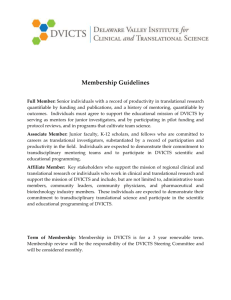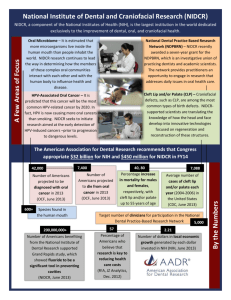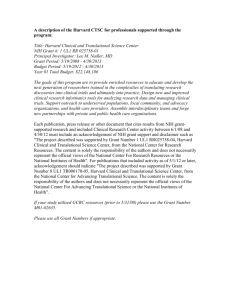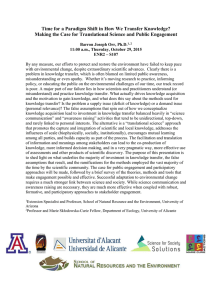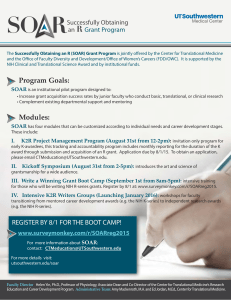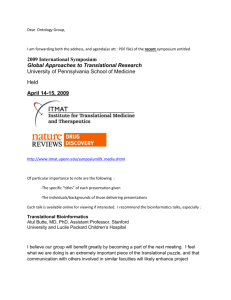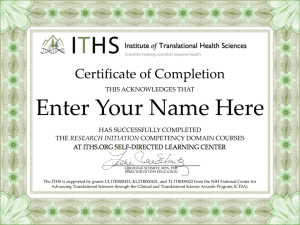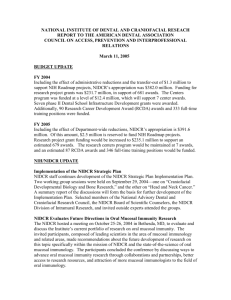ABSTRACT: 2013 ELAM Institutional Action Project Poster Symposium
advertisement
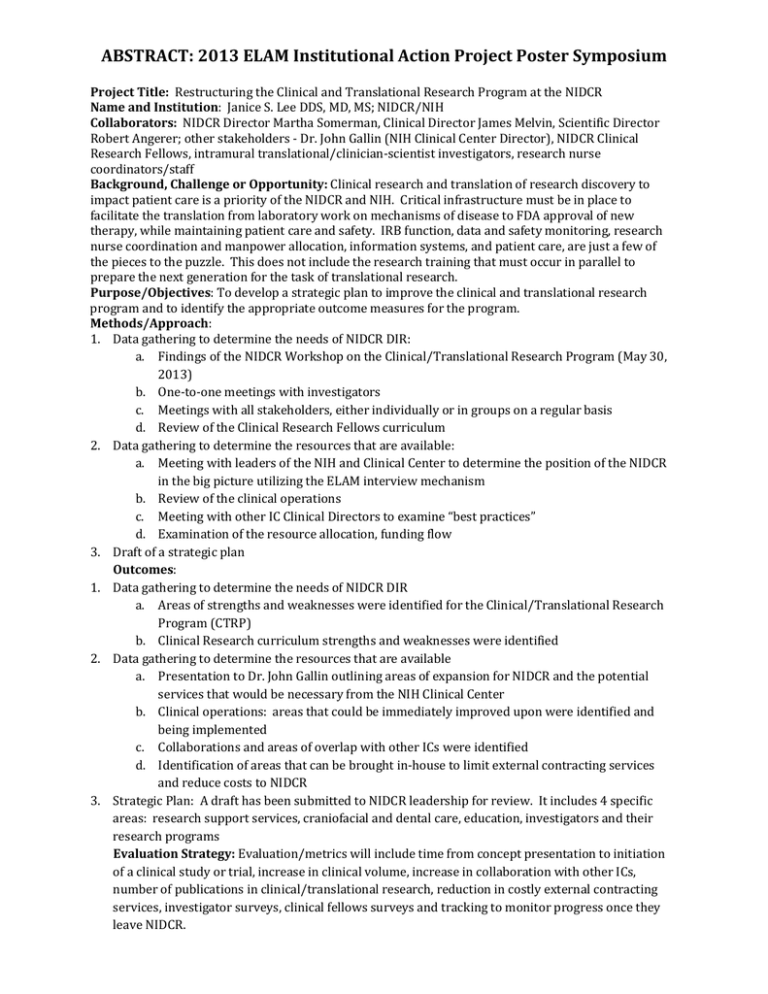
ABSTRACT: 2013 ELAM Institutional Action Project Poster Symposium Project Title: Restructuring the Clinical and Translational Research Program at the NIDCR Name and Institution: Janice S. Lee DDS, MD, MS; NIDCR/NIH Collaborators: NIDCR Director Martha Somerman, Clinical Director James Melvin, Scientific Director Robert Angerer; other stakeholders - Dr. John Gallin (NIH Clinical Center Director), NIDCR Clinical Research Fellows, intramural translational/clinician-scientist investigators, research nurse coordinators/staff Background, Challenge or Opportunity: Clinical research and translation of research discovery to impact patient care is a priority of the NIDCR and NIH. Critical infrastructure must be in place to facilitate the translation from laboratory work on mechanisms of disease to FDA approval of new therapy, while maintaining patient care and safety. IRB function, data and safety monitoring, research nurse coordination and manpower allocation, information systems, and patient care, are just a few of the pieces to the puzzle. This does not include the research training that must occur in parallel to prepare the next generation for the task of translational research. Purpose/Objectives: To develop a strategic plan to improve the clinical and translational research program and to identify the appropriate outcome measures for the program. Methods/Approach: 1. Data gathering to determine the needs of NIDCR DIR: a. Findings of the NIDCR Workshop on the Clinical/Translational Research Program (May 30, 2013) b. One-to-one meetings with investigators c. Meetings with all stakeholders, either individually or in groups on a regular basis d. Review of the Clinical Research Fellows curriculum 2. Data gathering to determine the resources that are available: a. Meeting with leaders of the NIH and Clinical Center to determine the position of the NIDCR in the big picture utilizing the ELAM interview mechanism b. Review of the clinical operations c. Meeting with other IC Clinical Directors to examine “best practices” d. Examination of the resource allocation, funding flow 3. Draft of a strategic plan Outcomes: 1. Data gathering to determine the needs of NIDCR DIR a. Areas of strengths and weaknesses were identified for the Clinical/Translational Research Program (CTRP) b. Clinical Research curriculum strengths and weaknesses were identified 2. Data gathering to determine the resources that are available a. Presentation to Dr. John Gallin outlining areas of expansion for NIDCR and the potential services that would be necessary from the NIH Clinical Center b. Clinical operations: areas that could be immediately improved upon were identified and being implemented c. Collaborations and areas of overlap with other ICs were identified d. Identification of areas that can be brought in-house to limit external contracting services and reduce costs to NIDCR 3. Strategic Plan: A draft has been submitted to NIDCR leadership for review. It includes 4 specific areas: research support services, craniofacial and dental care, education, investigators and their research programs Evaluation Strategy: Evaluation/metrics will include time from concept presentation to initiation of a clinical study or trial, increase in clinical volume, increase in collaboration with other ICs, number of publications in clinical/translational research, reduction in costly external contracting services, investigator surveys, clinical fellows surveys and tracking to monitor progress once they leave NIDCR. 2014 ELAM Leaders Forum Background: Supporting the best science and translation of research discovery to impact patient care is a priority of the NIDCR and NIH. There are multiple obstacles and challenges that slow clinical/translational research and clinical trials1. Critical infrastructure must be in place to facilitate the translation from the laboratory to FDA approval of new therapy, while maintaining patient care and safety. Simultaneously, research training must occur in parallel to prepare the next generation for Reference: 1. IOM Transforming Clinical Research in the US: Challenges and Opportunities 2010 the task of translational research and to address the shrinking clinical research workforce1. Objective: To develop a strategic plan for the clinical and translational research program at the NIDCR Intramural Research Program and to identify the appropriate outcome measures for the program. The National Institute of Dental and Craniofacial Research will be recognized as a catalyst for transforming how oral health care is delivered. This includes a more comprehensive integration of basic, clinical and population science to devise new tools and approaches to improve oral health. --Dr. Martha Somerman, NIDCR Director on the Strategic Plan 2014-2019. Methods: 1. Data gathering - needs of NIDCR DIR: -NIDCR Workshop on the Clinical/Translational Research Program (May 30, 2013) -NIDCR Strategic Plan 2014-2019 -One-to-one meetings with investigators and all stakeholders -Review of the Clinical Research Fellows curriculum 2. Data gathering - resources that are available: -Meeting with leaders of the NIH and Clinical Center to determine the position of the NIDCR in the big picture utilizing the ELAM interviews -Review of the clinical operations -Meeting with other IC Clinical Directors to examine “best practices” -Examination of the resource allocation, funding flow 3. Draft of a strategic plan Discussion: Since joining NIDCR/NIH 6 months ago, I have had the opportunity to work closely with NIDCR leadership and stakeholders to understand the culture of NIDCR/NIH and prepare for the development of a strategic plan for the CTRP. The ELAM program has given me the framework, the IAP project, leadership interviews that allowed me to accelerate the process. In this competitive environment, it gave me the tools to succeed in implementing various aspect of the strategic plan in the last 6 months, to identify my own strengths and weaknesses, to refine my leadership skills, and to focus on win-wins. Results: Strategic Plan draft – 4 areas of focus Summary: This Institutional Action Plan will continue over the next 5 years as follows –
